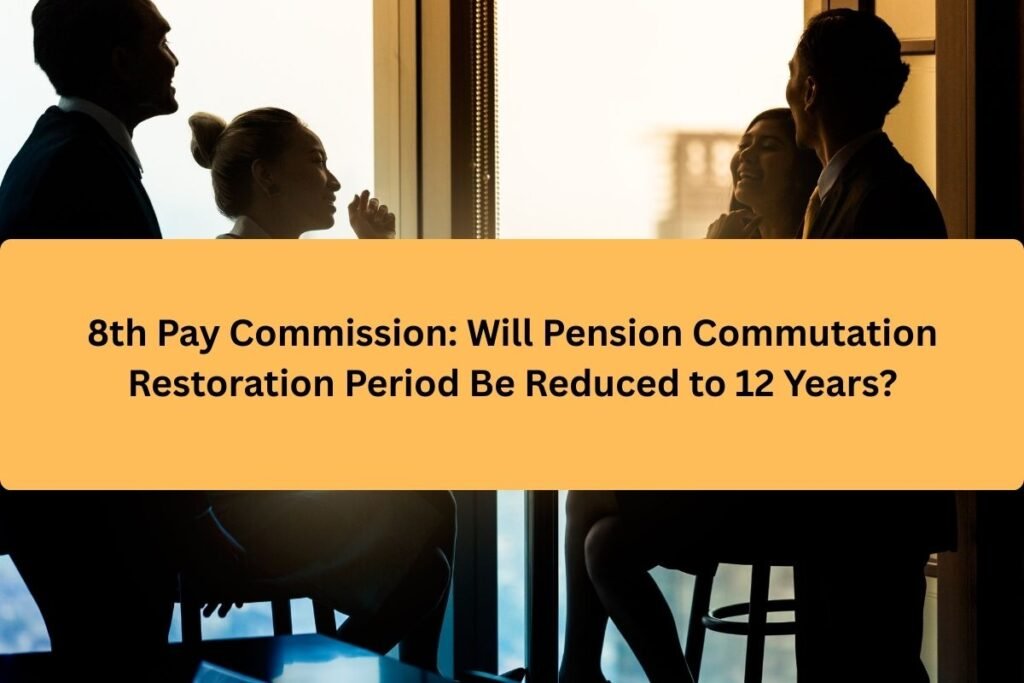The 8th Pay Commission discussions have once again brought the spotlight on a long-pending demand of central government employees and pensioners—reducing the pension commutation restoration period from 15 years to 12 years. With the finalisation of the Terms of Reference (ToR) approaching, employee unions are pressing hard to ensure that this issue finds a place on the agenda.

What is Pension Commutation?
At retirement, a central government employee has the option to take up to 40% of their pension in a lump sum, known as pension commutation. In exchange, their monthly pension is reduced by the same percentage. However, under the current system, the reduced amount is restored only after 15 years.
This means that although the government usually recovers the commuted value much earlier, pensioners must wait for 15 years before regaining their full pension entitlement.
Historical Background: 5th Pay Commission Recommendations
The 5th Pay Commission had recommended two significant changes:
- Allowing employees to commute up to 40% of pension (an increase from one-third).
- Restoring the commuted pension in 12 years instead of 15.
While the first recommendation was accepted, the 12-year restoration proposal was rejected, and the 15-year rule has continued since then.
| Pay Commission | Commutation Limit | Restoration Period Suggested | Accepted Period |
|---|---|---|---|
| 5th CPC | 1/3rd → 40% | 12 years | 15 years |
| Current Rule | 40% | — | 15 years |
Court Judgments on Commutation Period
The matter has been examined by the courts several times:
- In 1986 (Common Cause vs Union of India), the Supreme Court noted that while the government recovered the commuted pension within 12 years, the extra 3-year window was justified due to the “risk factor”, i.e., the possibility of early death of the pensioner.
- In 2019, the Delhi High Court upheld the 15-year rule, and the Supreme Court reaffirmed it, clarifying that this is a policy decision, not a judicial matter.
Thus, legally, the government has strong grounds to continue the 15-year restoration period.
Current Demands from Employee Unions
Employee representatives such as the NC-JCM (National Council of Joint Consultative Machinery) have been consistently demanding a 12-year restoration period. Their key arguments include:
- Increased life expectancy of pensioners.
- Changes in commutation tables and interest rates that allow the government to recover the amount faster.
- A fairer system that benefits pensioners who have already contributed decades of service.
These factors, according to unions, justify restoring pensions earlier than the present 15 years.
Government’s Stand on the Issue
The government maintains that the 15-year period is based on expert advice and actuarial calculations. It argues that both the 6th and 7th Pay Commissions did not find it necessary to revise the rule, thereby strengthening its stance.
Officials also highlight that shortening the restoration period could lead to higher recurring expenditure for the exchequer, which is already burdened by rising pension liabilities.
Conclusion
The pension commutation debate is not new—it has been pending since the 5th Pay Commission. With the 8th Pay Commission’s ToR under preparation, employees and pensioners are hopeful that their decades-old demand for 12-year restoration will finally be addressed.
Whether the government accepts this demand or sticks to the existing 15-year framework will directly impact lakhs of pensioners across India. For now, the issue remains one of the most closely watched aspects of the upcoming pay commission discussions.